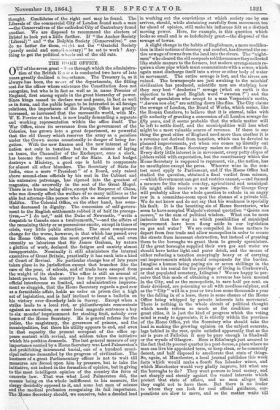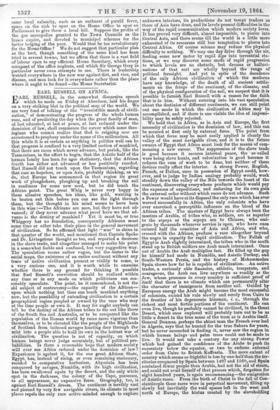THE I I ( )ME OFFICE.
nIIT of the seven great .es through which the administra- tion of the British E a )i. e is conducted two have of late years greatly declined n inicortance. The Treasury is, as it always has been, the 731 C«3 of the departments, the fitting seat for the officer whose existence the Constitution does not recognize, but who is in fact as well as in name Premier of England, first among equals in the great hierarchy of power. Since kings ceased to declare war and peace, in fact as well as in form, and the public began to be interested in all foreign relations, the importance of the Foreign Office has greatly increased, so increased that the mercantile world, with Mr. W. E. Forster at its head, is now loudly demanding a separate and working representation within the office itself. The War Office' since its severance from the government of the Colonies, has grown into a great department, so powerful that the old theory which reserves the army as a pectiliunt under the Crown seems occasionally in danger of being for- gotten. With the new finance and the new interest of the nation not only in taxation but in the science of laying on taxes, the Chancellor of the Exchequer, once a clerk, has become the second officer of the State. A bad budget destroys a Ministry, a good one is held to compensate for almost all other blunders. The Secretary of State for India, once a mere " President " of a Board, only raised above second-class officials by his seat in the Cabinet and his extensive patronage, has ripened into the greatest of magnates, sits avowedly in the seat of the Great Mogul. There is no human being alive, except the Emperor of China, who can directly affect the welfare of so many millions as the able but attorney-like person who sits as senior member for Halifax. The Colonial Office, on the other hand, has some- what decreased in dignity. The concession of self-govern- ment to the English settlements robbed it of half its preroga- tives,—" I do not," said the Duke of Newcastle, "write a despatch to Canada once a twelvemonth,"—and the affairs of the remaining thirty or 80 possessions excite, except in times of crisis, very little public attention. The most conspicuous change for the worse, however, is that which has passed over the Home Office, once the most powerful of all, and even recently so laborious that Sir James Graham, by nature a glutton of work, declared the fatigue and anxiety almost insupportable. Nominally it still administers the internal executive of Great Britain, practically it has sunk into a kind of Court of Revisal. No particular change has of late years taken place in its jurisdiction except that branches like the care of the poor, of schools, and of trade have escaped from the weight of its shadow. The office is still an arsenal of latent powers, but the country has for years been so quiet, official interference so limited, and administrative improve- ment so sluggish, that the Home Secretary regards a gaol row as a formidable affair, holds an order on prison diet a high act of legislation, and is half inclined to issue a bulletin on his victory over disorderly lads in Surrey. Except when a strike leads to a local riot, or philanthropists remonstrate against an execution, or some local magnate sentences a boy to six months' imprisonment for stealing fruit, nobody ever hears of the Home Secretary. He is general referee for the police, the magistracy, the governors of prisons, and the municipalities, but there his utility appears to end, and even in that capacity the present occupant of the office ap- pears content with revisal, and seldom takes the initiative which his position demands. The last general measure of any importance carried by a Home Secretary was Lord Palmerston's Act prohibiting intramural burial, one of a hundred muni- cipal reforms demanded by the progress of civilization. The business of a great Parliamentary officer is not to wait till measures are forced upon him by pressure, but to take the initiative, not indeed in the formation of opinion, but in giving to the most intelligent opinion of the country the force of concrete law. That was what Lord Palmerston did, the masses being on the whole indifferent to his measure, the clergy decidedly opposed to it, and none but men of science and the medical profession recognizing its full importance. The some Secretary should, we conceive, take a decided lead
in working out the convictions at which society one by one arrives, should, while abstaining carefully from movement too far ahead of opinion, still make his influence felt as a distinct moving power. Here, for example, is this question which looks so small and is so indefinitely great—the disposal of the sewage of towns.
A slight change in the habits of Englishmen, a mere modifica- tion in their notions of decency and comfort, hasdiverted the en- tire sewage of towns from the land into the rivers. The "night- men" who cleared the old cesspools sold the manure theycollected like stable manure to the farmers, but modern arrangements re- quire a close pipe which must communicate with a sewer, which again must discharge itself into a river or other body of water in movement. The entire sewage is lost, and the rivers are ruined. The townspeople are just awaking to the mischief civilization has produced, scientific men are studying how they may best "deodorize " sewage (what on earth is the objection to the good English word " sweeten ?") and the tribe of speculators who accept to a man Vespasian's motto, "Auruni non olet," are settling down like flies. The City claims the sewage of London, the Board of Works, which seems, like the Roman Conclave, to believe that it is eternal, talks with glib audacity of granting a concession of all London sewage for fifty years, and it seems probable that the whole matter will be left to settle itself, and the municipalities will lose what might be a most valuable source of revenue. If there is one thing the great cities of England need more than another it is a revenue not derived from taxation, which can be devoted to planned improvements, yet when one comes up literally out of the dirt, the Home Secretary makes no effort to secure it. Every dirty little interest is in movement, every petty clique of jobbers rabid with expectation, but the constituency which the Home Secretary is supposed to represent, viz., the nation, has no mouthpiece except the press. Whoever wins in the con- test must apply to Parliament, and if the Home Office had studied the question, obtained a final verdict from science, —which Government can get and vestries cannot,—and framed a measure for the whole country, agricultural and municipal life might alike receive a new impetus. Sir George Grey will probably allow the whole question to exhale in an angry row in a committee-room upon the clauses of a private bill. We do not know and do not say that his weakness is specially his fault. It is the besetting sin of Home Secretaries, who seem to have accepted Walpole's eternal quotation "Quieta non nzovere," as the sum of political wisdom. What can be more imbecile than the way in which possibilities of municipal improvement have been flung aside in our legislation on gas and water ? We are compelled in those matters to depart from free trade and allow monopolies in order to secure the streets from incessant obstruction, but instead of granting them to the boroughs we grant them to greedy speculators. If the great boroughs supplied their own gas and water we should have better light and purer drink, and the means of either reducing a taxation annoyingly heavy or of carrying out improvements which should compensate for the burden. Imagine a human being paying six or seven shillings in the pound on his rental for the privilege of living in Clerken well, or that populated cemetery, Islington ? We are happy to per- ceive that this mode of obtaining a revenue has been mooted in the City, and as the monopolists, to save half per cent. on their dividend, are poisoning us all with needless sulphur, and as the " City " will in a year or two lose some thousands a year by the falling in of a lease, there is some chance of the Home Office being whipped by private interests into movement. There is nothing in the whole circuit of political thought which needs reform so much as the condition of our great cities, it is just the kind of progress which the voting mind is ready to appreciate, it is strictly within the province of the Home Office, yet the Secretary who should take the lead in making the growing opinion on the subject concrete, lags behind in the rear, quite satisfied apparently that as the air is pure at Falloden it may be pure enough in Shadwell or the wynds of Glasgow. Here is Edinburgh just aroused to the fact that its poorest quarter is a pest-house, a place where no man can live his appointed term, or keep clean, or be commonly decent, and half disposed to ameliorate that state of things. So, again, at Manchester, a local journal publishes this week facts which would make a South Sea Islander wince, and which Manchester would very gladly improve, but what are the boroughs to do ? They want powers to lend money, and act sharply and sternly against the vested interests which protect that state of affairs, and no man alleges that they ought not to have them. But there is no leader to whom they can look for cool official guidance, cor- porations are slow to move, and so the matter waits till some local calamity, such as an outburst of putrid fever, spurs on the rich to spur on the Home Office to spur on Parliament to give them a local bill. Suppose the profits of the gas monopolies granted to the .Town Councils as the leases expire, and devoted to municipal schemes for the better lodging of the poor. Would that be too revolutionary for the Home Office ? We do not suggest that particular plan as the best, though something of the same kind has been tried in several towns, but we affirm that there is a vast field of labour open to any efficient Home Secretary, which every occupant of the office neglects, and which Sir George Grey in particular never even attempts to see. There is leadership wanted everywhere in the new war against dirt, and vice, and disease, and men look for it everywhere rather than the place where it ought to be found—the Home Secretariat.































 Previous page
Previous page